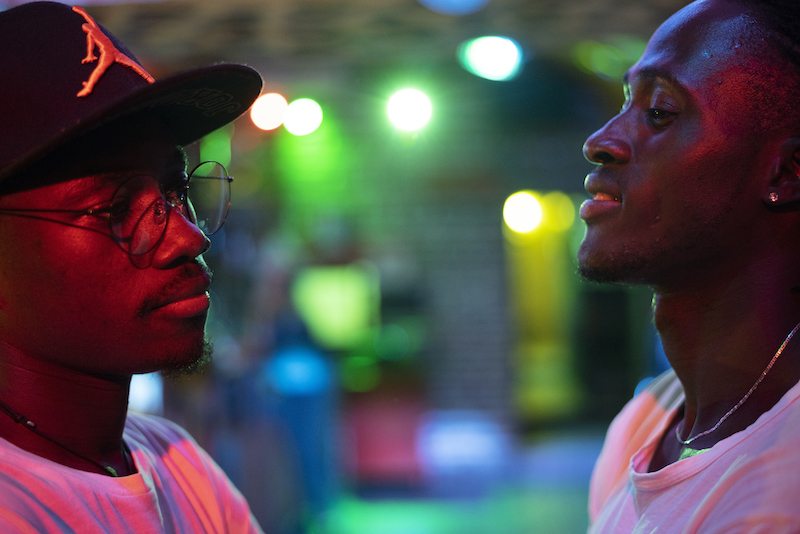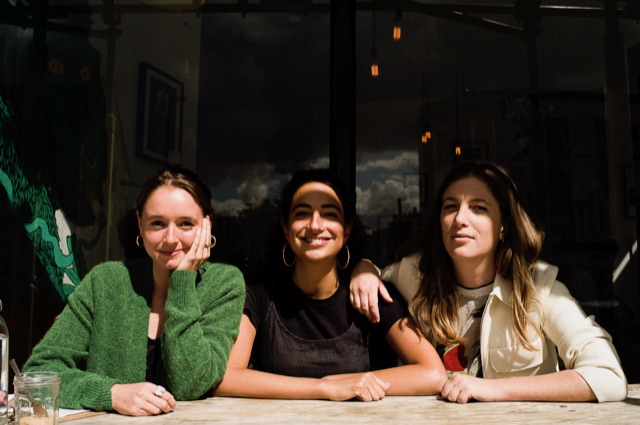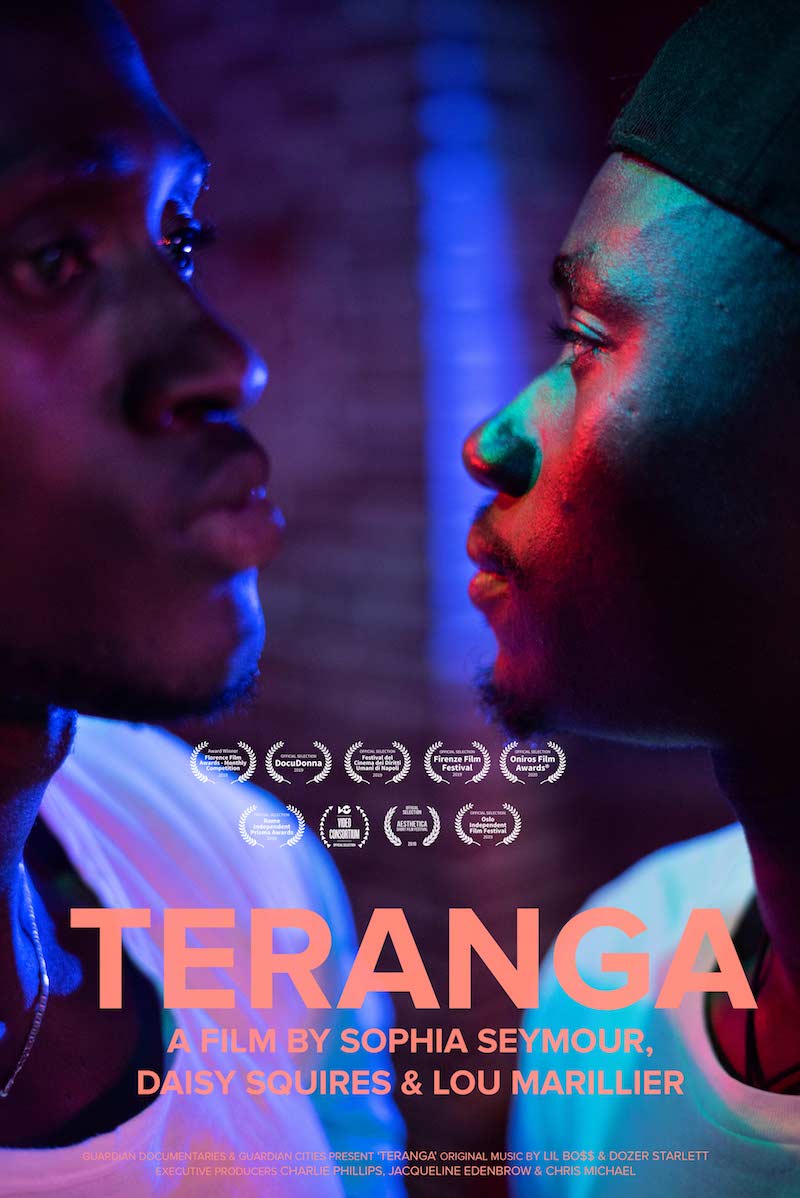
Explore the world of afrobeats in Napoli, Italy, and the budding community of struggling refugees who use music as solace from their traumatic past and corrupt circumstances of the migrant system.
Teranga, meaning “hospitality or welcoming generosity ” in wolof (a Senegalese language) uses the Afrobeats club scene of Napoli, Italy as a lens to tell the story of two asylum seekers, Fata and Yankuba, who navigate a corrupt migrant system, escaping their hardships through dance and communion in the Teranga, a club in Napoli’s Centro Storico.
Filmed over two years, the documentary is a snapshot into the life of the protagonists, waiting in limbo for answers to their asylum requests, and facing the uphill battle of corruption as refugees with almost nothing to their name except a passion for music and a relentless search for a better life. Throughout the documentary you can’t help but admire the resilience, ingenuity and ambition of Yankuba and Fata, a portrait that deviates from the mainstream narrative often used to portray refugees of their kind. After the long and traumatic journeys across the desert, Libya, and the Mediterranean Sea, both young refugees maintain dreams of long-stay visas that will allow them to pursue their dream jobs; Yankuba hopes to become a biochemist and Fata has dreams of becoming a world famous afrobeats DJ.
Teranga is a reminder of the power of music to create a community, provide an escape from our troubles, and nourish our dreams. To get deeper into the musical aspect of the documentary, PAM asked the British born director Sophia, who lived in Napoli for years engaging with the migrant community, some questions about the protagonists, the afrobeats music scene, and the community’s relationship to music.
Outside, on a night out at the Teranga, a patron says, “music is the portal to let Italians come into our world.” Did a local Italian scene frequent the Teranga to share the music and culture with the likes of Fata & Yankuba ?
When it was founded in 2005 by Judicael Ouango, a 35-year-old migrant from Burkina Faso, Teranga was conceived as an association to promote cultural exchange between Neapolitans and migrants. Judicael had experienced first hand the lack of cultural spaces where Italians and migrants could meet in Naples: Teranga was created to fill that void, with cultural events that included concerts but also various other activities including a literary cafe, weekly meals, etc. It was frequented by both migrants and Neapolitans, curious to learn more about West African culture. In 2015 however, when the ”immigration crisis” reached its peak and flocks of young men arrived in Naples, Teranga gradually evolved into a nightclub open everyday (bar Mondays), overwhelmingly frequented by young asylum seekers looking to escape from the grim reality of their corrupt welcome centres. This isn’t to say that Italians have stopped coming: in fact, during the two years we have been shooting, we saw the opposite unfold before our eyes, with an increasing number of young Neapolitans heading to the nights in the search of a new cool underground scene in the city. It’s hard to tell what exactly drove this evolution, but the explosion in popularity of Afrobeats likely played a part. The dance floor at Teranga has an equalizing nature: for at least a few hours, people from very different backgrounds dance together to the same music, transforming the club into a sort of laboratory for a bottom up form of integration. The owner Judicael has been keeping count and says that at least 173 babies have been born from meeting in Teranga: it’s anecdotal of course, but also quite an amusing symbol of the role Teranga has been able to play.
Music has a cathartic role for the patrons of the Teranga, but an inspirational role for Fata and his future. Outside of the Teranga, are there real opportunities for artists like Fata, or will he inevitably have to move to London or Berlin ?
Teranga played an instrumental role in Fata’s transformation into a DJ. When we started filming, Fata didn’t have a DJ program on his ancient laptop, let alone DJ decks. He saved up for almost a year, selling swimsuits or umbrellas depending on the season, hustling tirelessly. In Teranga, he would carefully observe DJ Sass, the tracks he chose to play, which beats drove the crowd crazy, and then replicate it in his camp or on Facebook lives being streamed to his many followers spread in The Gambia and across Europe. Fata is immensely ambitious and goal-oriented, and very disciplined. Gradually, he started playing in Teranga but also in the small network of other Afrobeat/Dancehall clubs in Naples. He has also become associated with a music collective called One Voice, which started out as a DIY studio in Naples set up by DJ Sass and Nigga Thiuf/Carbone 14, a Senegalese producer. The collective supports, promotes and nurtures asylum seeker talents like Fata and others, including Dozer Gang, C-Boy and Lil Bo$$ (whose music is the soundtrack of Teranga). They represent a slowly growing scene, which remains very niche in Naples and like many other asylum seekers, Fata perceives Naples as a transit place rather than a goal in itself. His dream is to travel the world, and he did manage to move to Berlin for six months to DJ, until his permit to stay expired and he was forced to return to Naples. He has now applied to renew his permit to stay but has been waiting for over a year now, back in the metaphorical waiting room.
Will tourists travelling to Napoli be welcome at the Teranga ? Once there, what can one expect at a night out in this local bar ?
Teranga translates as the notion of hospitality, generosity and welcomeness in Wolof, and that’s what you get. Once people filter down into the basement club, they can leave their coat, grab their aperol spritz in the bar and dance away to Afrobeats and dancehall tunes. Everyone is more than welcome.
The night really gets going after 1am when the room begins to fill up. The club is mainly filled with young men (who make up 90% of the asylum seekers in Italy): most of them are Muslim, and are sipping on juice instead of alcohol. This creates a very rare and nurturing environment, where the focus really is on the music and dancing and which feels respectful and secure, especially for women.
As Yankuba states, “teranga is not a normal club whatsoever, teranga is a place you go to feel alive again”. If you are there on a Sunday, you could join the social and share African food before partying.
At his most troubling moments throughout the documentary Yankuba turned to music as an escape and for a sense of relief. Did you ever get a catch of what he was listening to?
Yankuba has a broad taste in music ranging from traditional Gambian pop music to Jamaican Dancehall. Back when Yankuba was in the camp, he and his roommates would sing in unison old traditional songs by artists such as Fatou Gewel but they would also dance around their rooms to Timaya, Davido and Run-Town. Fata was more interested in accruing the coolest songs from the internet which were trending on mixtapes made by DJ’s he was following back home and across Europe. He made a whatsapp group called World Sound Music where migrants across Europe shared tracks and mixtapes and promoted their club nights. His favourites are Mavado, Vybz Cartel, Popcaan and Spice and Chronixx.
What can you tell us about Yankuba and Fata’s relationship to music ? How are they different / similar ?
Fata and Yankuba’s distinct backgrounds and dreams complemented each other. Despite the differences in their ambitions, their shared circumstances and love for music brought them together in Naples, dancing nights away together in Teranga. Both Fata and Yankuba see music as a way to connect with others, a common language they share with Neapolitans in an otherwise very excluding and isolating environment. On average, asylum seekers wait for five years for a final response to their asylum procedure in Italy: during this time, they usually aren’t allowed to work, and they are left to wait in often very corrupt immigration camps. For both Fata and Yankuba, music therefore manifests itself as not only a form of escapism, but also as a survival mechanism, and a form of resistance in the face of the dehumanising system they are stuck in. But whilst music is an end in itself for Fata, music is more of a tool for Yankuba to escape the boredom and intellectual frustration of his camp. For Fata, music has always been a driving force: he was a music promoter in the Gambia before setting off to Europe, and decided to become a DJ in his first camp, an abandoned seaside resort where he lived for two years. Music is an integral part of his life: whether in his room, in his camp, for himself or for others, Fata listens and plays music all the time. Yankuba’s relationship to music is more circumstantial: boredom and frustration led him to write lyrics in the darkness of his camp’s bedroom, between solving two math equations. He loves music, and Teranga, but as an escape he also finds solace in reading, writing and tutoring his old pupils back home. He reached out to an Italian producer on facebook who he befriended and recorded tracks that he has written in the camp, they even ended up organising Open Nights with his fellow migrants. Writing lyrics became a necessary way for him to ‘keep his brain alive’ and a way to meet Italian.
Have anti-racism movements and journalistic exposure like this documentary helped mitigate corruption and prejudice in Italian communities, or is the problem systematic?
The problem is definitely systemic: in Italy, welcome centres for asylum seekers are often run by private landlords and social cooperatives who have become increasingly attracted by the lucrative profit margins. The money funnelled in from the EU to house asylum seekers is around €35 per night per asylum seeker. This was originally intended for living costs, health and legal services, however money often ended up in the pockets of corrupt officials, which transformed the humanitarian crisis into a multi-million euro business. However, the fact that the problem is systemic hopefully doesn’t mean that citizen-led movements or documentaries can’t play their part: the two aren’t necessarily mutually exclusive. We realize our documentary Teranga alone most likely won’t help mitigate corruption, but we hope it can participate in a wider effort to gradually change the perception of migrants in Italy. The documentary was well received in Italy, and covered by all the main media outlets, which pleasantly surprised us and made us feel like there was a need for this type of stories in today’s media landscape in Italy. Hopefully, Teranga can help create proximity with Fata and Yankuba, and by extension with the many young, ambitious, resourceful asylum seekers waiting for their lives to start again all across Italy and Europe.

What can readers do to support refugees in Italy and closer to home ? Does Fata still DJ ? Is it possible to follow his aspiring career ?
We hope the film helps to familiarise a wider audience with the effect that waiting for documentation, often for years, has on asylum seekers’ well-being. Through our website, we want to encourage involvement with organizations across Europe that foster mentorship and community-building in order to help asylum-seekers reach their goals, and alleviate their isolation.
Fata and Yankuba are far from being free from the relentless trails of the immigration system. Their very precarious financial situation poses constant difficulties, with jobs rarely secured by contract and wages at very low rates. Yankuba was accepted into university in Wales, but so far hasn’t been able to save enough money to afford the fees. We have set up a crowdfunder to help Yankuba save up enough to afford his dream of going to university.
Fata’s residence permit has expired, and he is now back in the metaphorical “waiting room”, hoping for it to be renewed. They both remain vulnerable to the political volatility in Italy, and the successive changes in policies and government. In autumn 2018, the two-year “humanitarian protection” residence permit they received, an Italy-specific permit for those not eligible for refugee status but who still are deemed unable to be sent back, was abolished by former interior minister Matteo Salvini. This has meant that many migrants in Fata and Yankuba’s position are unlikely to get their permits renewed, with ISPI predicting that there may well be nearly 140,000 additional irregular migrants living in Italy by the end of 2020.
Therefore we hope that through Teranga we can encourage people to support Fata and the other asylum seeker artists who contributed to Teranga, even if that is following their music.
Finally, we have been holding Q&As and panels with asylum-seekers, activists and experts on the issues related to immigration and integration in Italy and the UK and hope to do many more. Next week, we will host our first assembly in a school in south London and are very much open to further experiences of this kind. So while the filmmaking process is over, we hope the completed documentary can take on a life of its own to spark debate, dissolve prejudice and encourage meaningful and urgent action.
The irony of Teranga both as a welcoming place for locals and refugees, and an its very definition, is not lost. While the owners of the club managed to create a space that embraced these young refugees, it remains a microcosm in a larger political picture of corruption and abuse. In the EU alone there are over 900,000 asylum seekers, and in Italy, refugees wait for an average of five years before receiving any kind of definitive response to their status. While they wait, 81% of these asylum seekers are forced to live in conditions similar to that of Fata and Yankuba; in privately run housing exploited by corrupt landlords and careless social workers.
In the same way the world embraces the rich and beautiful heritage of African music, we must also embrace those who seek refuge from turbulent circumstances within the continent. Music had the power to soothe the anguish of Fata and Yankuba, and it can also build the cultural bridges necessary to bring people together in a song and dance.
To support the Teranga and follow the progress of Fata’s DJ career check out these links:
- Follow Fata’s DJ career on Instagram and Facebook
- Follow the Teranga documentary on social media on Instagram and Facebook




